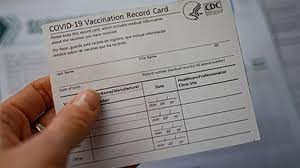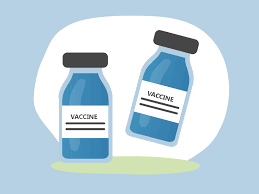The Latest Evidence Regarding COVID-19 Vaccines, Including the New Vaccines
Greetings, everybody!
You may recognize some of the information in this post. Don’t worry, you’re not having deja-vu. At the time of the original posting of this article, it did contain the latest information. However, as expected, the information has changed. Therefore, read on to learn the LATEST, latest evidence about the newest COVID-19 vaccines, and what they mean to your health!
Collectively, we have been through a lot since the first confirmed case of COVID-19. We have seen peaks and valleys in reported cases, hospitalization rates, and deaths. We have seen variants and sub-variants of the initial virus. Additionally, we have seen proposed treatments, ranging from those with poor evidence, to newer treatments that at times, pharmacies have difficulty keeping in stock. However, one “cliche” that has long existed regarding health care still seems to apply. That cliche is “An ounce of prevention is worth a pound of treatment” and the preventative measures that consistently make news are the vaccines. One reason the vaccines get so much attention is because people become concerned if these vaccines are still beneficial. Will getting the available booster shots prevent me from getting infected with COVID-19? Should I mix the brands of available vaccines?
Now, both Pfizer and Moderna have had their respective updated bivalent COVID vaccines authorized and released. This may create some confusion among patients regarding the new vaccine recommendations and guidelines.

With this post, I hope to address these questions and concerns. Please note that I intend to avoid any political arguments, and focus on the evidence shared by the Center of Disease Control (CDC) regarding these vaccines.
Which COVID-19 vaccines are currently available?
With the recent authorization and release of some new vaccines, the roles of the vaccines available have changed. The original monovalent vaccines by Pfizer and Moderna are still preferred by the CDC and the Food and Drug Administration (FDA) to complete the initial series. In early May 2022, the FDA announced the limitation of the Janssen vaccine to those 18 years of age or older for whom other authorized COVID-19 vaccines are not accessible or clinically appropriate. This is mainly due to increased risks of rare blood clots when compared with the other vaccines. In July 2022, the FDA issued an emergency use authorization for another option called Novavax, which has been used in other countries prior to being released in the United States. Also, in September 2022, emergency authorization was granted for the updated Pfizer and Moderna bivalent vaccines.
So how are these newer vaccines different than the previous ones, and what are their advantages?
Without being too technical, the main difference is that the original monovalent Pfizer and Moderna vaccines use messenger RNA (mRNA) to teach the body to create an immune response from the COVID virus. The recently-released Novavax vaccine contains the spike protein of the virus itself to stimulate the immune system. While Novavax does offer different technology, any advantage over the Pfizer or Moderna monovalent vaccines is questionable, as the research for the development of Novavax centered on an older version of the COVID-19 virus which has not been nearly as prevalent for recent infections, as the virus has continued to change.
The newly-authorized bivalent Pfizer and Moderna vaccines also differ from their predecessors. The bivalent vaccines target two strains of COVID-19; the original virus (Delta), and the Omicron variant (and subvariants), which have been responsible for the majority of the recent outbreaks.
What is the schedule for these vaccines?

As mentioned above, with the release of the new vaccines, there have been some important changes in the schedules of administration. Here is a breakdown of the new adult guidelines for both the primary series and the boosters:
The Primary Series:
For Pfizer Monovalent: Approved for ages 12 and older. 1st dose followed by 2nd dose three weeks later. It is important to know that the monovalent vaccine is no longer authorized to be administered as a booster. The bivalent vaccine will solely be used as a booster at this time.
For Moderna Monovalent: Approved for ages 18 and older. 1st dose followed by 2nd dose four weeks later. These monovalent vaccines are also no longer authorized to be administer as a booster. The bivalent vaccine will solely be used as a booster at this time.
For Janssen: Authorized for ages 18 or older. If you received the Janssen vaccine for the first dose, you may still receive either the Pfizer or Moderna bivalent vaccine as a booster.
For Novavax: Authorized for ages 12 or older. 1st dose followed by 2nd dose three weeks later.
Additionally, both Pfizer and Moderna monovalent vaccines are authorized to be administered to children 6 months and older. Fewer pharmacies currently offer vaccination services to children this young, so please check with your pharmacist if you are interested in this.
For the Boosters:
For Pfizer bivalent: Authorized for ages 12 or older. One single booster dose administered two months after completion of the primary series OR two months after the most recent booster with a monovalent vaccine. It is important to know the Pfizer bivalent vaccine is NOT approved for the primary series of COVID vaccines.
For Moderna bivalent: Authorized for ages 18 or older. One single booster dose administered two months after completion of the primary series OR two months after the most recent booster with a monovalent vaccine. It is important to know that the Moderna bivalent vaccine is NOT approved for the primary series of COVID vaccines.
Read the CDC’s updated vaccine recommendations for more detail about schedules for children and those who are immunocompromised.
What is considered immunocompromised?
People with impaired immune systems are already at greater risk for general infections. Additionally, these patients are at greater risk of severe complications with COVID-19 infections. While the new guidelines for boosters is to receive only one additional dose for all eligible patients, this may change in the future. Here is what the CDC considers to be immunocompromised:
-Recipient of solid or bone marrow transplant
-Active treatment for solid tumor or blood malignancies
-Take immunosuppressive medications such as steroids
-Advanced or untreated HIV infection
Please note: While having health conditions such as asthma, high blood pressure, diabetes, etc., may put you at higher risk of COVID-19 complications, these conditions are not considered immunocompromised regarding these vaccines.
Should I mix the different brands of vaccines for better protection?
This is one of the most common questions I receive about the vaccines. The short answer is, it is up to you. Since there are some differences between the Pfizer and Moderna vaccines, it is theorized that receiving both brands will provide better protection against COVID-19. The good news is that mixing the brands does not appear to significantly increase risks for the patient. However, I have not seen strong evidence that mixing these vaccines provides superior protection.
Are the booster doses effective?


